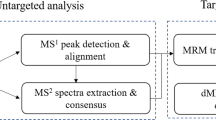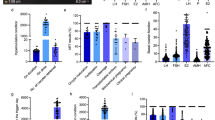Abstract
Purpose
The decline in female fecundity with age may be caused by decreased oocyte quality, a factor that may be associated with the altered composition of follicular fluid (FF).
Methods
In an effort to better understand follicular aging and the role of lipids in a given biological system, we present a prospective study that compares lipid profiles of FF from women older than 35 years (aging group, n = 12) to women equal or younger than 35 years old (control group, n = 17). FF lipids were extracted, and mass spectra were generated using a Waters Synapt G1 Q-TOF in MS mode. MS data was evaluated for both multi- and univariate statistics. The lipids identified as potential biomarkers of follicle aging were attributed by the online databases Lipid Maps, followed by pathway network analysis using Cytoscape software.
Results
The in vitro fertilization (IVF) parameters showed significant differences in aging, number of follicles, total number of oocytes and oocytes in MII, and number of injected oocytes. Additionally, FF from the aging group revealed 11 lipids with higher abundance, while FF from the control group included 4 lipids with higher abundance.
Conclusions
We suspect that aging may influence lipid metabolism in a downstream cascade leading, ultimately, to decreased oocyte quality. The discovery of target lipids may assist oocyte selection for IVF in the future. Furthermore, systems biology approach based on post-genomic medicine may help unravel a number of altered mechanisms not previously understood.




Similar content being viewed by others
References
Luk J, Greenfeld DA, Seli E. Third party reproduction and the aging couple. Maturitas. 2010;66:389–96.
Sauer MV. Reproduction at an advanced maternal age and maternal health. Fertil Steril. 2015;103:1136–43.
Wang T, Gao YY, Chen L, Nie ZW, Cheng W, Liu X, et al. Melatonin prevents postovulatory oocyte aging and promotes subsequent embryonic development in the pig. Aging. 2017;9:1552–64.
Schmidt T, Sobotka JG, Bentzen A, Nyboe A. On behalf of the ESHRE reproduction and society task force. Demographic and medical consequences of the postponement of parenthood. Hum Reprod Update. 2012;1:29–43.
Kedem A, Yung Y, Yerushalmi GM, Haas J, Maman E, Hanochi M, et al. Anti Müllerian hormone (AMH) level and expression in mural and cumulus cells in relation to age. J Ovarian Res. 2014;11:113.
Klein NA, Houmard BS, Hansen KR, Woodruff TK, Sluss PM, Bremner WJ, et al. Age-related analysis of inhibin A, inhibin B, and activin a relative to the intercycle monotropic follicle-stimulating hormone rise in normal ovulatory women. J Clin Endocrinol Metab. 2004;89:2977–81.
Bracewell-Milnes T, Saso S, Abdalla H, Nikolau D, Norman-Taylor J, Johnson M, et al. Metabolomics as a tool to identify biomarkers to predict and improve outcomes in reproductive medicine: a systematic review. Hum Reprod Update. 2017;23:723–36.
O'Gorman A, Wallace M, Cottell E, Gibney MJ, McAuliffe FM, Wingfield M, et al. Metabolic profiling of human follicular fluid identifies potential biomarkers of oocyte developmental competence. Reproduction. 2013;146:389–95.
Schiller J, Arnhold J, Benard S, Müller M, Reichl S, Arnold K. Lipid analysis by matrix-assisted laser desorption and ionization mass spectrometry: a methodological approach. Anal Biochem. 1999;267:46–56.
Montani DA, Cordeiro FB, Regiani T, Victorino AB, Pilau EJ, Gozzo FC, et al. The follicular microenvironment as a predictor of pregnancy: MALDI-TOF MS lipid profile in cumulus cells. J Assist Reprod Genet. 2012;29:1289–97.
Bligh EG, Dyer WJ. A rapid method of total lipid extraction and purification. Can J Biochem Physiol. 1959;37:911–7.
Cordeiro FB, Cataldi TR, Perkel KJ, do Vale Teixeira da Costa L, Rochetti RC, Stevanato J, et al. Lipidomics analysis of follicular fluid by ESI-MS reveals potential biomarkers for ovarian endometriosis. J Assist Reprod Genet. 2015;32:1817–25.
Takahashi T, Igarashi H, Amita M, Hara S, Kurachi H. Cellular and molecular mechanisms of various types of oocyte aging. Reprod Med Biol. 2011;10:239–49.
Dumesic DA, Meldrum DR, Katz-Jaffe MG, Krisher RL, Schoolcraft WB. Oocyte environment: follicular fluid and cumulus cells are critical for oocyte health. Fertil Steril. 2015;103:303–16.
Lin PY, Huang FJ, Kung FT, Chiang HJ, Lin YJ, Lin YC, et al. Evaluation of serum anti-Mullerian hormone as a biomarker of early ovarian aging in young women undergoing IVF/ICSI cycle. Int J Clin Exp Pathol. 2014 Aug 15;7(9):6245–53.
Ng EH, Ho PC. Ageing and ART: a waste of time and money? Best Pract Res Clin Obstet Gynaecol. 2007;21:5–20.
Zhang D, Keilty D, Zhang ZF, Chian RC. Mitochondria in oocyte aging: current understanding. Facts Views Vis Obgyn. 2017;9:29–38.
Cordeiro FB, Cataldi TR, do Vale Teixeira da Costa L, de Lima CB, Stevanato J, Zylbersztejn DS, et al. Follicular fluid lipid fingerprinting from women with PCOS and hyper response during IVF treatment. J Assist Reprod Genet. 2015;32:45–54.
Andrieu-Abadie N, Levade T. Sphingomyelin hydrolysis during apoptosis. Biochim Biophys Acta. 2002;1585:126–34.
Lucki NC, Sewer MB. The interplay between bioactive sphingolipids and steroid hormones. Steroids. 2010;75:390–9.
Hannun YA. The sphingomyelin cycle and the second messenger function of ceramide. J Biol Chem. 1994;4:3125–8.
Yang X, Wu LL, Chura LR, Liang X, Lane M, Norman RJ, et al. Exposure to lipid-rich follicular fluid is associated with endoplasmic reticulum stress and impaired oocyte maturation in cumulus-oocyte complexes. Fertil Steril. 2012;97:1438–43.
Ruebel ML, Cotter M, Sims CR, Moutos DM, Badger TM, Cleves MA, et al. Obesity modulates inflammation and lipid metabolism oocyte gene expression: a single-cell transcriptome perspective. J Clin Endocrinol Metab. 2017;102:2029–38.
Cataldi T, Cordeiro FB, Costa Ldo V, Pilau EJ, Ferreira CR, Gozzo FC, et al. Lipid profiling of follicular fluid from women undergoing IVF: young poor ovarian responders versus normal responders. Hum Fertil. 2013;16:269–77.
Onalan G, Selam B, Baran Y, Cincik M, Onalan R, Gündüz U, et al. Serum and follicular fluid levels of soluble Fas, soluble Fas ligand and apoptosis of luteinized granulosa cells in PCOS patients undergoing IVF. Hum Reprod. 2005;20:2391–5.
Wonnacott KE, Kwong WY, Hughes J, Salter AM, Lea RG, Garnsworthy PC, et al. Dietary omega-3 and -6 polyunsaturated fatty acids affect the composition and development of sheep granulosa cells, oocytes and embryos. Reproduction. 2010;139:57–69.
Ciepiela P, Bączkowski T, Drozd A, Kazienko A, Stachowska E, Kurzawa R. Arachidonic and linoleic acid derivatives impact oocyte ICSI fertilization—a prospective analysis of follicular fluid and a matched oocyte in a ‘one follicle—one retrieved oocyte—one resulting embryo’ investigational setting. PLoS One. 2015;10(3):e0119087.
Gougeon A. Human ovarian follicular development: from activation of resting follicles to preovulatory maturation. Ann Endocrinol (Paris). 2010;71:132–43.
Franciosi F, Manandhar S, Conti M. FSH regulates mRNA translation in mouse oocytes and promotes developmental competence. Endocrinology. 2016;157:872–82.
Author information
Authors and Affiliations
Corresponding author
Ethics declarations
The authors comply with Springer’s Ethical Policies. The study received approval by the Ethics in Research Committee of São Paulo Federal University. Informed consent was obtained from all individual participants included in the study. All experiments were performed in accordance with relevant guidelines and regulations.
Electronic supplementary material
ESM 1
(PDF 534 kb)
Rights and permissions
About this article
Cite this article
Cordeiro, F.B., Montani, D.A., Pilau, E.J. et al. Ovarian environment aging: follicular fluid lipidomic and related metabolic pathways. J Assist Reprod Genet 35, 1385–1393 (2018). https://doi.org/10.1007/s10815-018-1259-5
Received:
Accepted:
Published:
Issue Date:
DOI: https://doi.org/10.1007/s10815-018-1259-5




